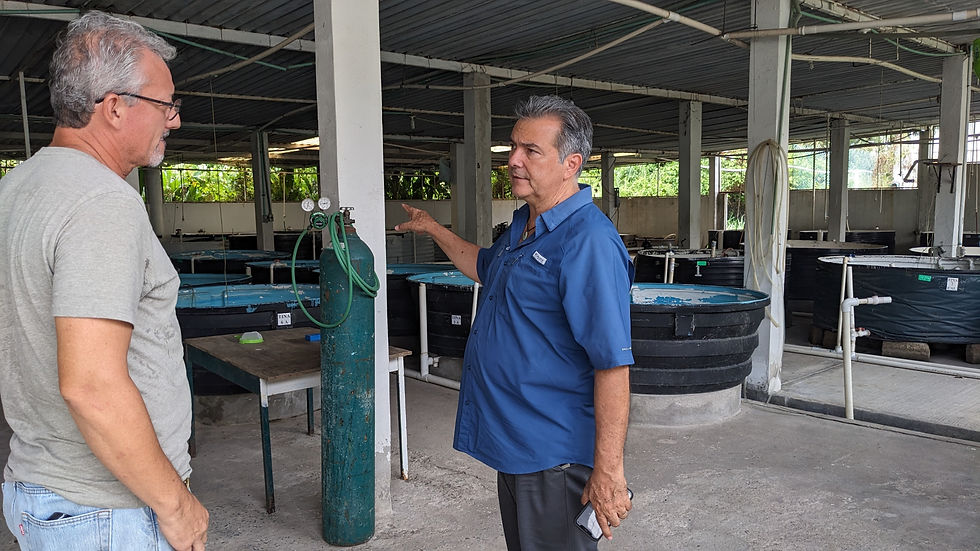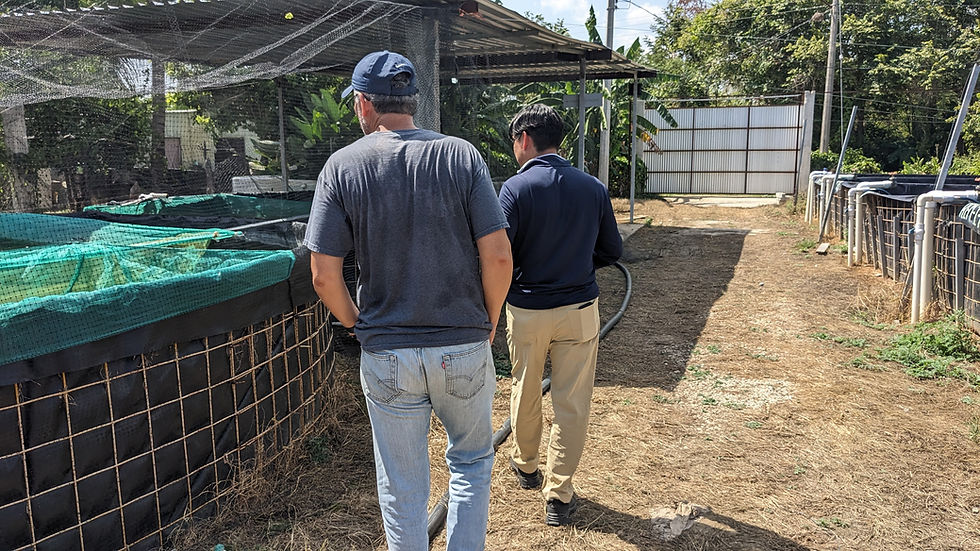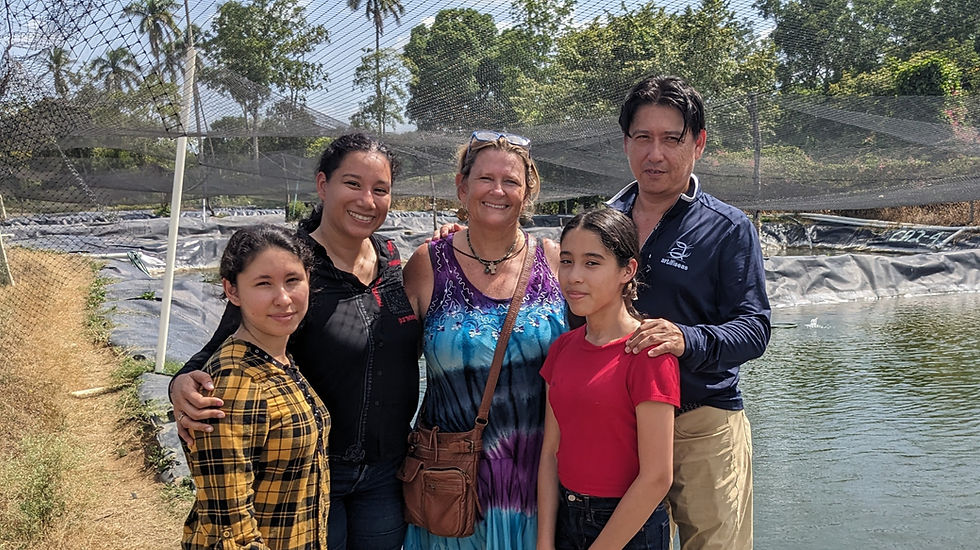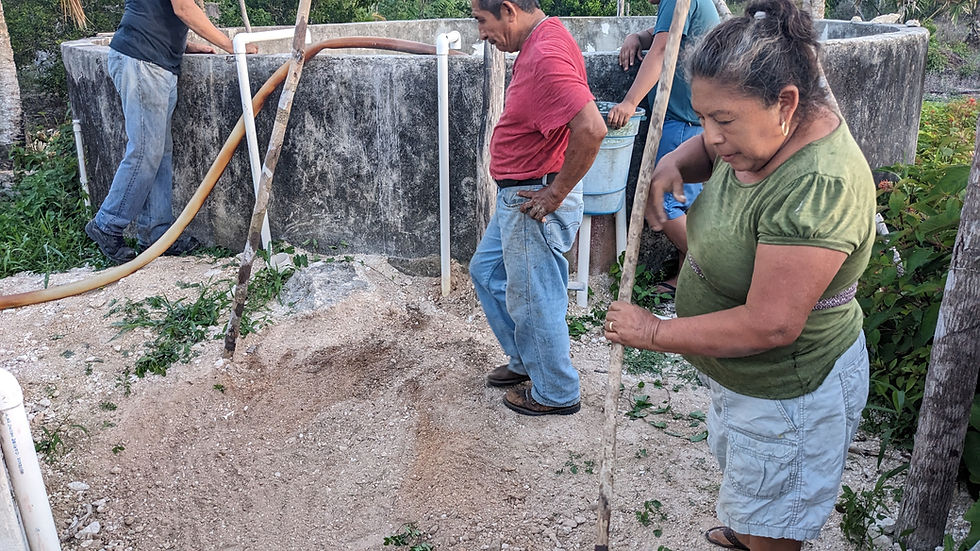Feeding Families, Protecting the Jungle: How a Small Project Became a Big Vision
- Laura LaBrie

- Aug 15, 2025
- 6 min read
Updated: Aug 29, 2025
We need your help. Every dollar/peso goes directly to Eugenia's fish tanks.
In all honesty, I feel a bit overwhelmed. So much happened on our recent trip to Tabasco that was unexpected, unconsidered, unthought-of, even unheard-of. I never would have dreamed they would roll out the red carpet for us, two simple people trying to help a local family, a local community.

It’s a bit like finding a sparkly stone on the beach and sticking it on your pocket. Pulling it out occasionally and admiring its shimmers. And then one day pulling it out and showing it to your grandfather who immediately knows that it is a priceless jewel.
Maybe that is a bit much, but that is how I feel.
We were just going to help a nice little Maya lady fix her fish tanks. We were just going to help her buy some baby fish. Then we were just going to find the leaks in the tanks. Then we were just going to help her make a new filter for the tanks. Then we were just going to help her figure out a better way to keep the water clear and the fish healthy….we were just.
And then we were standing in a university hallway with an important man who has a title I can’t remember. I just call him the President of the Fish. Everyone who interacted with him treated him with the utmost respect. He was a bit dirty and ruffled, but his shirt was a Columbia sport-fishing button up shirt. He was obviously working, engrossed completely in research and growing not only fish, but crocodiles and other fabulous animals.
We thought he might assign someone to give us a tour of the facility, but he didn’t. He stopped his work for us and took half a day to show us everything and then invited his team to join us in a meeting while we explained our little fish farm project.
He sat - well they all sat - in rapt attention.
It was hard to understand why. It was just a little broken fish farm we wanted to fix and fill with a few fish.
It was just a pretty rock I found on the beach.
Well, apparently, it was much more than that. And as everything unfolded, I tried to grasp what was happening. As I sat and listened while they talked, the depth of the project began to come into focus. The importance, the expanse, the implications began to become clear.
It wasn’t just about growing a few fish. It was about preserving wildlife and land. It wasn’t just about feeding a family, it was about feeding many families. It wasn’t just about fixing a fish tank, it was about creating sustainable farming.
This is where it gets hard for me to write this, to explain how I was feeling and the opening of my mind.
I sat in a small airconditioned room in the hot and humid lowlands of the Mexican state of Tabasco at a University research facility with the people who expansively understand fish and farming and sustainable and feeding families and protecting wildlife. These are the leaders, the ones on the cutting edge, the ones with vision for the country and vision for the future.
And they saw things in our little project that I didn’t see.

The president of the fish assigned one of his team members to accompany us the following day to a fish farm owned and operated by another man who once worked with him but was now retired from University life. We spent a day there learning, talking, seeing potential. And the following day we were escorted to another fish farm, not owned by a rustic farmer, but by another science wielding man who breeds fish in a cutting-edge manner.

We walked and talked as we saw the facilities.
And I began to understand the impact we were already having on our own little community.

You see, in Yucatan there is very little dirt on top of the rocky ground. It is difficult to grow much of anything. The trees are short and stocky and there are lots of spikey plants. There are no rolling fields of rice or sugarcane or huge swaths of bananas like there are in Tabasco. Even the corn is grown among short palm trees and huge rocky outcroppings.
And it isn’t that this lack of good soil only impacts how much food farmers can grow. The bigger picture is that big developers are scooping up hectares of land, bulldozing it, and turning it into resort hotels, shopping malls, and condo complexes. Maya families traditionally own land, but since it doesn’t produce much, they can’t really make a living with it. So, when they are offered even a small amount, in cash, they are motivated to sell because they don’t need unproductive land, they need cash in their pockets.
But here is the magic.
They don’t have soil…..but they DO have water. Cenote water. Clear, clean, easily accessible water. It is perfect for farming fish instead of corn or bananas or sugar cane.
And there is a huge market for fish because the area is coastal, and fish have always traditionally been consumed here. Which brings up the problem with overfishing in the ocean. It's getting harder and harder for fisherman to bring in the harvest they are accustomed to.
So, farming fish lessens the impact of wild fish. It also means the families won’t feel so motived to sell their land, which protects wildlife and virgin jungle. It only takes a tiny bit of land to farm fish, unlike farming corn which means clearing acres of land. So, most of the land can remain untouched. And the jaguars and monkeys and wild pigs and deer and tejones and iguanas and parrots and toucans can continue to enjoy their wild homes.
In addition, fish farming is something single moms can do. The work is well suited to nurturing, to consistency, and to attention to detail and patience. It isn’t full of heavy lifting. It can provide means for women to produce food and income for their families. This is super important according to the President of The Fish and his associates. They were thrilled we were already working with Eugenia, a Mexican woman who is a landowner in her own right.

And not just that, but it gives her family, her children as they grow into adults, a place to work in their own community. Many young people can't find work in their communities, so they are leaving pueblos and going to work in the big hotels, or worse, going to work for the cartels. Fish farming offers these young people a way to feel ownership of their land and their life, to produce food and income, and to stay in their village which strengthens family and community and preserves culture.
And what about sustainable practices?
Because we are working with a family in a tiny town and with not much money, we have developed methods that use local resources and are inexpensive.
It means using the runoff from the fish tanks to fertilize and grow local plants that can be dried and ground into food for the fish, greatly reducing the cost of fish food and creating organic, natural food so farmers don’t need to rely on commercial chemical and hormone-filled fish food.
It means using gravity rather than electric bubblers to provide oxygen to the water, reducing electricity and cost.
It means using simple, locally purchased items in the filter rather than fancy gadgets. This way when something breaks (which it always does) it is super easy to replace and costs very little.
Our little problem-solving adventures produced (without our really considering it) ways to not just fix a few fish tanks, but to be able to cost effectively sustain those farms for years to come. Most of the time, when people come in and help people in these small communities, as soon as they leave, the local people are left unable to continue on their own. It doesn’t really help them at all if they cant take ownership of it and continue working for years to come.
My mind is a bit overloaded. I never stopped to think of all the ways this little project would help people. And we intend to help another family when Eugenia is fully up and running. And then another after that.
I never imagined:
· Feeding a family
· Producing jobs and income
· Protecting land and wildlife
· Supporting communities
· Protecting culture
· Taking pressure off wild fish
· And so important, building confidence, self-sufficiency and self-esteem in local women.
And here I thought it was just a pretty stone I picked up on the beach.
In truth, it is a treasure.
Hugs and butterflies,
Laura
We need your help. Every dollar/peso goes directly to Eugenia's fish tanks.
.png)


Comments